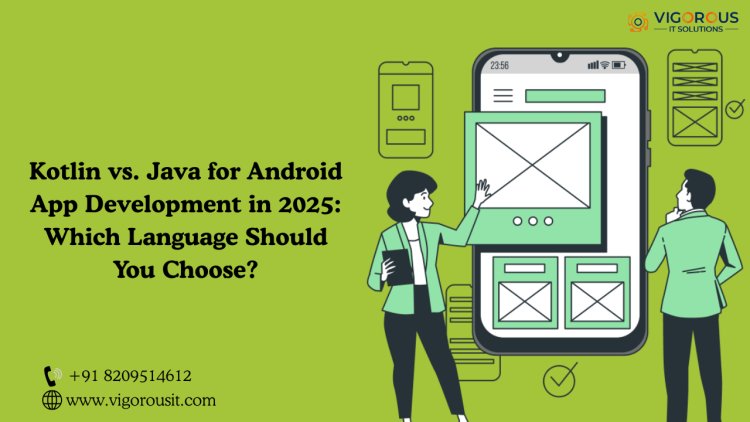Kotlin vs. Java for Android App Development in 2025: Which Language Should You Choose?
Share this Post to earn Money ( Upto ₹100 per 1000 Views )

In this article, we provide a comprehensive analysis of Kotlin vs. Java for Android App Development in 2025: Which Language Should You Choose? As the Android ecosystem evolves, understanding the strengths and limitations of both languages is crucial for developers and businesses aiming to build robust, future-ready mobile solutions.
Interoperability and Transitioning in Android App Development
Kotlin and Java can coexist within the same Android App Development project, allowing teams to migrate gradually or leverage the strengths of both languages. This interoperability ensures that existing Java codebases remain valuable while new features can be developed in Kotlin for improved safety and efficiency.
Developers can call Java code from Kotlin and vice versa, use Java libraries in Kotlin projects, and benefit from Kotlin’s null safety even when interacting with Java code. This flexibility is essential for businesses looking to modernize their Android apps without a complete rewrite.
Kotlin vs. Java for Android App Development in 2025: Which Language Should You Choose?
As Android App Development evolves, the choice between Kotlin and Java remains critical. While both languages have their strengths, Kotlin has emerged as the preferred choice for new projects, whereas Java still holds value for specific use cases. Here’s a deeper analysis to help you decide:
1. Official Support and Community
-
Kotlin: Officially supported by Google since 2017, Kotlin has grown rapidly with strong backing from JetBrains and the Android developer community.
-
Java: Still widely used with a massive legacy codebase and large developer community, but newer Android tools and updates are more Kotlin-focused.
2. Code Conciseness and Readability
-
Kotlin: Offers more concise and expressive syntax, reducing boilerplate code and improving developer productivity.
-
Java: Verbose and requires more lines of code to achieve the same functionality, which can lead to longer development times.
3. Performance
-
Kotlin: Compiles to bytecode and runs on the JVM just like Java, offering comparable runtime performance.
-
Java: Reliable and mature in terms of performance but lacks some modern features that optimize newer app development.
4. Interoperability
-
Kotlin: 100% interoperable with Java, allowing developers to use existing Java libraries and frameworks in Kotlin projects.
-
Java: Can call Kotlin code, but the interoperability is smoother when migrating from Java to Kotlin rather than the reverse.
5. Learning Curve and Developer Experience
-
Kotlin: Easier for beginners to pick up due to cleaner syntax and modern features like null safety and extension functions.
-
Java: Familiar to most developers with a programming background, especially those coming from a traditional CS curriculum.
6. Tooling and IDE Support
-
Kotlin: Excellent support in Android Studio, including smart suggestions and error handling tailored for Kotlin.
-
Java: Fully supported as well, but newer tools and updates often prioritize Kotlin features first.
7. Job Market and Future Outlook
-
Kotlin: Demand for Kotlin developers is rising as more companies adopt it for new Android projects.
-
Java: Still in demand, especially for maintaining legacy apps and backend systems.
Which Language Should You Choose for Android App Development?
Choosing the right programming language for Android App Development is a crucial decision that impacts your app’s performance. This guide will help you weigh the pros and cons of each language so you can make an informed decision for your Android App Development needs.
Why Kotlin is the Best Choice for New Projects
Kotlin has emerged as the preferred language for Android App Development, especially since Google’s official endorsement in 2017. Its concise syntax, modern features, and full interoperability with Java make it highly attractive for both new and existing projects.
Kotlin’s main advantages include:
-
Conciseness and Readability: Developers can write less code, reducing boilerplate and making the codebase easier to maintain.
-
Null Safety: Built-in null safety features help prevent null pointer exceptions, a common source of crashes in Android apps.
-
Modern Language Features: Support for lambdas, extension functions, smart casts, and data classes streamlines development and enhances code quality.
-
Coroutines: Native coroutine support simplifies asynchronous programming, improving app performance and responsiveness.
-
Interoperability: Kotlin is fully interoperable with Java, allowing seamless integration and gradual migration of existing codebases.
-
Community and Tooling: A rapidly growing community and strong support in Android Studio ensure robust resources and tooling for developers.
Kotlin’s design focuses on developer productivity and app stability, making it a compelling choice for forward-looking Android App Development projects in 2025.
Java for Android App Development
Java remains a foundational language for Android App Development, known for its maturity, stability, and vast ecosystem. Many enterprise and legacy applications still rely on Java, and its extensive libraries and frameworks continue to offer significant value.
Key strengths of Java include:
-
Mature Ecosystem: Decades of development have resulted in a rich set of libraries, frameworks, and community support.
-
Stability and Reliability: Java’s long-standing presence in Android ensures stability, making it suitable for large-scale and legacy projects.
-
Platform Independence: Java’s “write once, run anywhere” philosophy allows code to run across different platforms with minimal changes.
-
Widespread Adoption: The large pool of experienced Java developers makes it easier to find talent and maintain existing codebases.
Conclusion
For Android App Development in 2025, Kotlin stands out as the modern, efficient, and future-proof choice, offering concise syntax, advanced features, and robust safety. Java remains relevant for legacy support and stability. For optimal results, partner with Vigorous IT solutions to leverage the best of both worlds and drive your Android projects forward.

 Ruchi2024
Ruchi2024 














